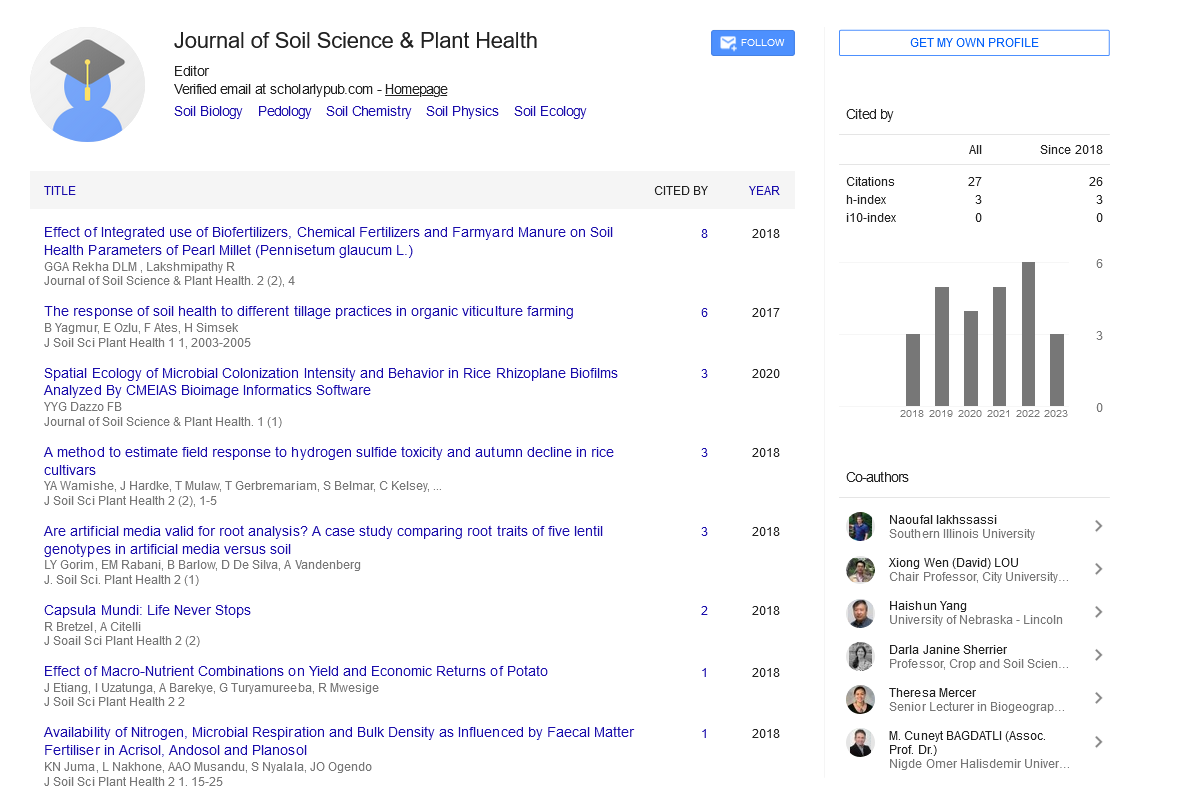Opinion Article, Vol: 7 Issue: 1
Unleashing the Power of Agricultural Soil Science: Optimizing Soil Health for Sustainable Crop Production
Miroslav Kutílek*Department of Ecosystem Science and Management, Pennsylvania State University, PA, USA
*Corresponding Author: Miroslav Kutílek
Department of Ecosystem Science and
Management
Pennsylvania State University, PA, USA
E-mail: miroslav.4684@vy.cz
Received date: 27 January, 2023, Manuscript No. JSPH-23-96257;
Editor assigned date: 30 January, 2023; PreQC No. JSPH-23-96257 (PQ);
Reviewed date: 14 February, 2023; QC No. JSPH-23-96257;
Revised date: 21 February, 2023; Manuscript No. JSPH-23-96257(R);
Published date: 28 February, 2023, DOI:10.4172/jsph.10000178
Citation: Kutílek M (2023) Exploring Sustainable Agricultural Practices for Enhancing Soil Health. Adv Biomed Res Innov 6:1.
Description
Agricultural soil science plays an essential role in understanding the intricate relationship between soil health and crop production. Healthy soils are the foundation of sustainable agriculture, as they provide essential nutrients, water holding capacity, and support beneficial microbial communities that promote plant growth. However, modern agricultural practices such as intensive tillage, chemical inputs, and monoculture cropping have led to soil degradation, erosion, and loss of fertility, posing significant challenges to global food security and environmental sustainability. In this manuscript, we highlight the importance of agricultural soil science in optimizing soil health for sustainable crop production. We review the key principles of soil science, including soil physical, chemical, and biological properties, and their interactions that influence plant growth. We discuss the impact of agricultural practices on soil health and highlight innovative approaches to restore and maintain soil fertility, structure, and biological diversity. We also emphasize the importance of soil conservation practices and precision agriculture technologies in mitigating soil degradation and improving crop productivity. We further explore the role of soil management practices, such as cover cropping, crop rotation, and integrated nutrient management, in enhancing soil health and reducing environmental impacts. Lastly, we discuss the future prospects of agricultural soil science, including emerging technologies such as remote sensing, precision soil mapping, and soil genomics that have the potential to revolutionize our understanding of soil health and its management.
Soil is a dynamic and complex natural resource that serves as the foundation for agriculture and supports human livelihoods. Agricultural soil science is a multidisciplinary field that integrates knowledge from soil physics, chemistry, biology, and agronomy to understand the intricate interactions between soil and plants. Healthy soils are fundamental for long-term agricultural productivity because they offer essential nutrients, store water, and maintain beneficial microbial communities.
Soil properties and their interactions
Soil is a complex matrix of mineral particles, organic matter, water, air, and living organisms. The physical, chemical, and biological properties of soil interact in intricate ways that influence plant growth. Soil physical properties, such as texture, structure, and porosity, determine water infiltration, retention, and drainage, which in turn affect plant water availability and root growth. Soil chemical properties, such as pH, nutrient availability, and cation exchange capacity, influence plant nutrient uptake and availability. Soil biological properties, such as microbial biomass, diversity, and activity, play a crucial role in nutrient cycling, organic matter decomposition, and plant-microbe interactions. These properties are interconnected and influence each other, and their interactions are critical for soil health and crop production.
Impact of agricultural practices on soil health
Modern agricultural practices have significantly impacted soil health, leading to soil degradation, erosion, and loss of fertility. Intensive tillage, common in conventional agriculture, disrupts soil structure and increases erosion, water runoff, and carbon loss. Chemical inputs, such as synthetic fertilizers and pesticides, can disrupt soil microbial communities, alter nutrient cycling, and contribute to nutrient imbalances and environmental pollution. Monoculture cropping, the practice of growing a single crop in a field year after year, can lead to nutrient depletion, increased pest and disease pressure, and reduced biodiversity. These practices have resulted in declining soil fertility, reduced crop productivity, and increased environmental risks.
 Spanish
Spanish  Chinese
Chinese  Russian
Russian  German
German  French
French  Japanese
Japanese  Portuguese
Portuguese  Hindi
Hindi 